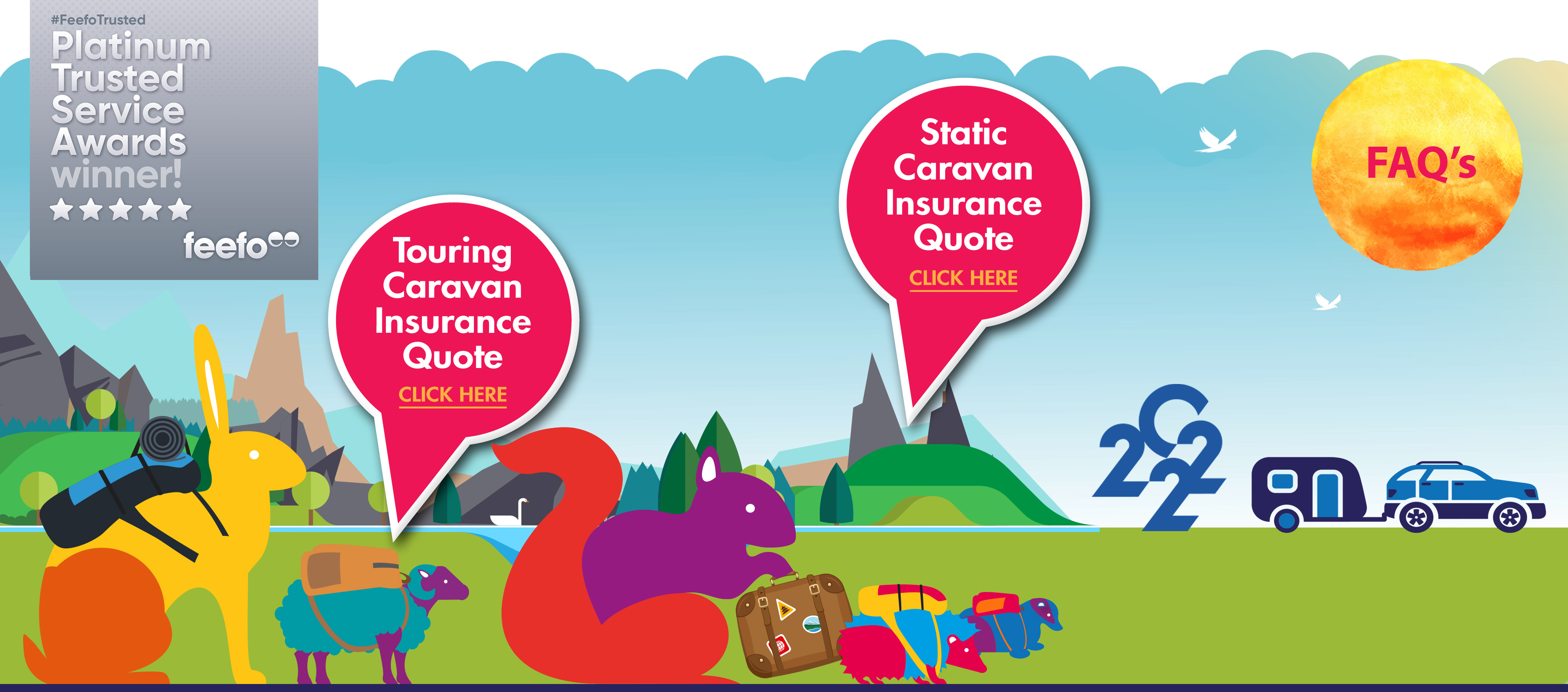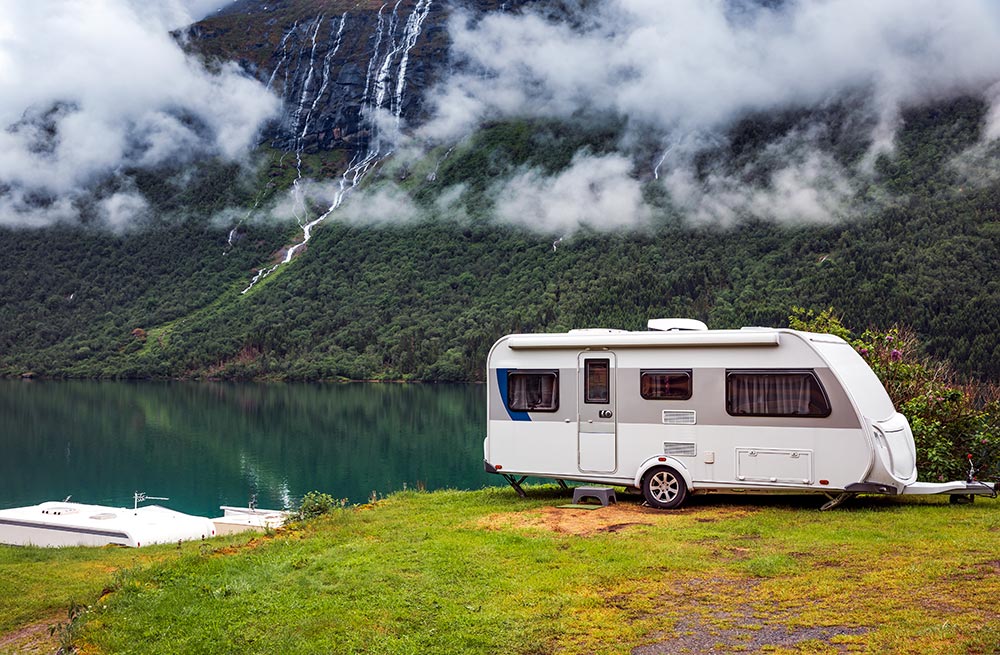Top 5 UK destinations for Christmas in your ‘van
While the familiar comforts of home are always enticing, you might be after a change of scene and pace this festive season. Why not consider taking your caravan out for a short – and utterly magical – Christmas getaway?
Here are five top UK destinations that make for delightful Christmas caravanning, plus one bonus treasure to add to your winter route planning.
Or take a look at our site reviews for more destination inspiration.
Constable country
Constable’s paintings of rural life in East Anglia are rightly regarded as national treasures.
Set around Essex and Suffolk, they capture the spirit of a bygone age – except that it’s not quite ‘bygone’! In fact, there are beautiful villages and small towns in this area, many adorned with small cottages and thatched roofs. That’s to say nothing of some of the oldest pubs in the country and with their roaring log fires, they’re a great place for Christmas dinner.
Now it’s true that most shops and entertainments in the towns are going to be closed over the holidays but these days that’s usually just on the 25th itself. So, you can combine rural explorations with looking around ancient towns such as Norwich (Norfolk) and Ipswich.
If you are thinking of a pub restaurant for Christmas dinner – remember to book ahead as they’re usually very popular.
Further reading: 10 places to visit in Suffolk and Bucks Farm CL Site Review.
Edinburgh
Scotland’s captivating capital brims with festive spirit, from its Gothic architecture dusted with snow to vibrant Christmas markets and the iconic Hogmanay celebrations.
Although chilly, Edinburgh’s winter magic more than makes up for it – just pack your thermal layers. Hogmanay tickets are in high demand; grab them as soon as possible for the ultimate New Year’s Eve experience.
Further reading: Explore Scotland and Ten places to visit in Scotland in your ‘van.
The Cotswolds
This is one of those areas that people seem to struggle to precisely define in geographic terms other than to say it’s ‘sort of’ parts of Warwickshire, Oxfordshire, Gloucestershire, Wiltshire, Somerset and Worcestershire.
In a sense, its precise boundaries don’t matter because the whole area is beautiful and it undoubtedly has some of the most picturesque villages and towns in the UK.
It’s a marvellous area for peace and quiet in winter, though again you’ll find some fantastic pubs and restaurants.
Further reading: Caravanning in the Cotswolds.
York and the moors
Many would argue that the city of York is the most beautiful in the UK. It’s a wonderful mixture of Roman, Anglo-Saxon, Viking, Norman and Mediaeval styles and you’ll find history on every corner.
The town is usually buzzing, which is great if your stay starts a few days before Christmas and carries on towards New Year. Inevitably, much will be closed in the city on 25th/26th but just walking the streets is magical.
The nearby moors offer some of the wildest and most impressive countryside in England. Make sure you keep in touch with the weather forecasts though – moorland countryside at altitude can be dangerous if the weather is very severe and you’re unprepared.
Further reading: Visit York and York Caravan Park Site Review.
Devon, Dorset and Cornwall
These three counties in the far west of England may have summer holiday connotations but they’re also popular over Christmas.
There are historic towns everywhere and an enormous coastline. Walking along doing some beachcombing with the dog is a thought that appeals to many. And a brisk stroll on the clifftops will certainly blow the cobwebs away!
Towns such as Lyme Regis are always pretty and full of interesting things to see and do. Not only that but those pasties might make a nice change from cold Turkey for days after the 25th!
Further reading: 9 places to visit in Devon and UK caravan holiday ideas: From Cornwall to the Scottish Highlands.
Bonus: The Isle of Wight
Praised for its abundant beaches, coastal charm, and attractions like Quarr Abbey and Ventnor Botanic Gardens – this sunny island is a hidden gem for winter caravanning. The seafront towns recall nostalgic British holidays, pubs are cosy, walks are refreshing, and quirkiness abounds – even a hovercraft remains in service. A truly festive coastal retreat!
Further reading: Guide to caravanning on the Isle of Wight and Appuldurcombe Gardens Holiday Park Site Review.
6 tips for a smooth and festive caravan trip
- Check your caravan insurance: Ensure it covers winter trips and any limits on annual usage or site security requirements.
- Confirm campsite operations: Make sure sites are open during Christmas, and that water, heating, and electricity will be available.
- Book early: Sites and restaurants fill fast – especially for Christmas Day or festive meals.
- Pack winter gear: Bring waterproof, windproof, and warm layers. Double-check that your caravan heating is in perfect working order.
- Watch the weather: Areas like the moors can be spectacular but changeable – keep an eye on forecasts.
- Plan festive stops: Think about nearby pubs, markets, or attractions that stay open over the holidays.
Ready for a Winter Adventure?
These destinations offer a festive blend of scenery, tranquillity, and seasonal delights. Whether you’re wandering snowy moors, exploring medieval cities, or waking up to frost-kissed beaches, a Christmas caravan trip adds a refreshingly different layer to your festive traditions.
Great caravan gadgets for 2025/26
Already planning where your caravan adventures will take you for the rest of this year and for 2026?
Then here are some of the latest handy, clever, and sometimes quirky gadgets worth considering for your caravanning trips. Note that these can be bought online or in-store from various retailers :
Jack pads
- we can’t promise that your next caravan pitch is going to be a muddy field under several days of relentless rain – but you’re as familiar with the British weather as we are;
- to stop the legs or corner steadies of your caravan from sinking into the soft ground, why not try caravan jack pads – your caravan will stay all the steadier for them;
Warm as toast
- there’s rarely much room in the caravan’s galley, so you’ll be limited in the range of appliances you can run;
- low-wattage appliances designed for caravans are a lifesaver, like compact toasters and kettles that won’t overload your electrics. In 2025, energy-efficient models are even more compact and eco-friendly, with some designed to reduce water and power use;
- the Swiss Luxx Low Wattage Caravan Toaster is specially designed for use in a caravan since it is diminutive in size – and consumes only 750 watts of electricity;
- a matching one-litre, low-wattage electric kettle is also available;
Your secret stash
- looking for a discreet hiding place for small valuables? Diversion safes disguised as everyday items – from soft drink cans to soup tins – remain a popular choice;
- they’re simple, low-cost, and add an extra layer of peace of mind when leaving the caravan unattended;
- for more advice, see our Guide to caravan security
Cool in summer
- with UK summers now hotter than ever, keeping food and drinks chilled is a must;
- high-capacity cool boxes keep ice frozen for days, making them ideal for both caravan use and picnics. Newer models now feature improved insulation and some even offer USB charging ports or built-in bottle openers;
Fire safety
- fire precautions remain essential. Collapsible, UV-resistant fire buckets are lightweight, easy to store, and can double as water carriers or even food storage when not in use;
- some designs even integrate reflective strips for extra visibility at night;
- for peace of mind, read our advice on Fire safety tips in your ‘van;
Round or square?
- that round washing-up bowl can be handy to use but tricky to store when you need to load your caravan with everything – including the kitchen sink;
- a handy way around that problem, therefore, is to invest in a collapsible square washing-up bowl;
You can never have enough of them
- you can probably never have enough airtight food and drink containers, so a collapsible, silicone kitchen bundle is a welcome addition to storage solutions in the galley;
- the bundle of collapsible silicone bowls and boxes let you heat, bake, freeze, mix, store and pour.
If it’s only to show off your latest collection of caravan gadgets and accessories, you’ll be raring to get set for your next caravan outing soon into the New Year.
More gadgets: Guide to Caravan Gadgets and Which caravan gadgets?
Please note that we do not receive any commissions for the sale of any of these products. The gadgets suggested are for information purposes only and should not be seen as recommendations of Cover4Caravans.co.uk.
Todderstaffe Hall Farm CL – Site Review
[Caravan & Motorhome Club CL – 5 pitches site, members only]
FY6 8LF
Date of Visit: August 2025
Overall View
The CL site is a field to one side of a working farm and an orchard on the other side. It is level and a mixture of hardstanding and grass. It is close to Blackpool and access is from the M55 -please see arrival video HERE. There is a section of road – before the railway bridge that is particularly uneven and requires great care.
This site is family friendly and dogs are very welcome by arrangement but must be kept on a lead at all times due to the working nature of the farm. There are plenty of farm tracks across the fields which you can take your dog for a walk.

Facilities
There is 16 amp EHU hookup to each pitch, fresh water tap and grey waste is disposed of into the hedge line around the site. In effect a serviced pitch.
There is a CDP emptying point on your right as you enter the site plus a rubbish bin.
In the nearest farm building, there is a single toilet which you are able to use. It is level access, however, there are no grab rails and no basin, just some sanitising liquid
TV and radio were good using the directional aerial tilted. Our neighbour struggled with an omnidirectional ‘flying saucer’ type aerial.
Mobile wise all the network providers offered 4G with EE and Vodafone stepping it up to 5G outdoors. TV streaming worked fine with EE. There was no WiFi on site.
There is no gate to the site, however, the main farm gate is shut of an evening. It is not locked so access is not a problem.
Review of Site Pitch
Each pitch is hardstanding and sufficiently wide enough to place your car and caravan, whilst allowing you to pitch your awning/canopy on the grass if you so wish. Alternatively, it is possible to park your vehicle and awning on the hardstanding and car to the front. The site is level throughout.
Grass is regularly mowed and the gravel on the pitches and roadway is kept clean.
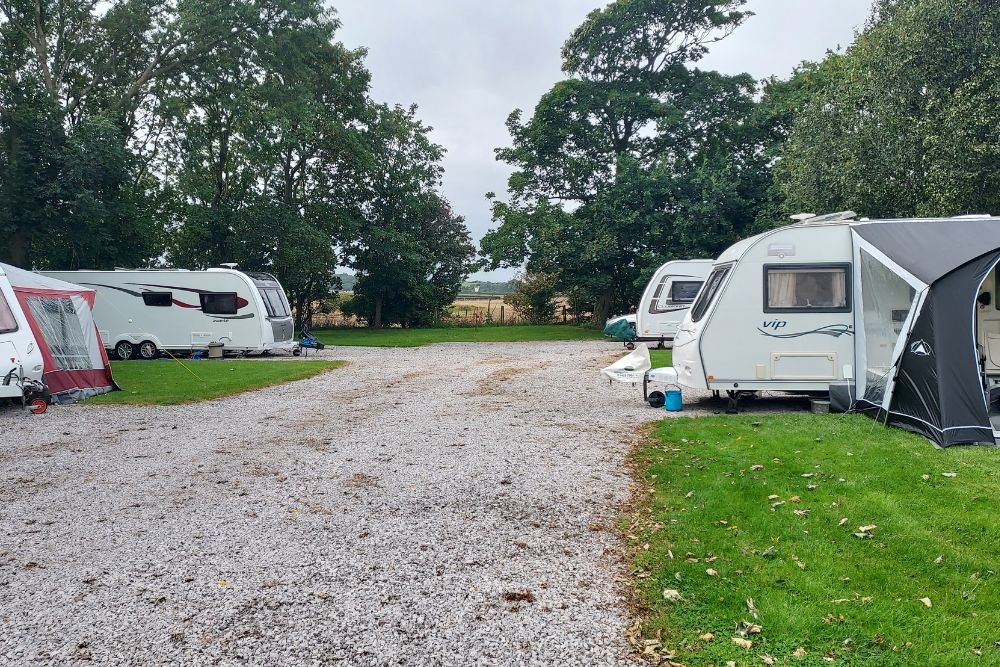
Around and about
There is a Shell garage and a Lidl about a 15 minute drive from the site – these are your nearest retail and fuel options. Garstang and Poulton le Fylde, both market towns have further facilities.
There are no direct bus stops close to the site – it is at the end of a no through road. The nearest is approximately a 40 minute walk.
The site has the added benefit of being very close to Blackpool – a seaside resort which hardly needs any introduction. Two events which are of note are the annual air show in August – usually including the Red Arrows and the Euro Typhoon Display Team. The second is the annual Blackpool Illuminations – starting at the end of August each year. For further information please see https://www.visitblackpool.com/
Equally, due to its central location, it is possible to explore many other towns, resorts in the County of Lancashire. Cleveleys, Fleetwood, Lytham St Annes to name a few.
https://www.visitlancashire.com/ will give you a comprehensive list of places.
The historical county town of Lancaster, equally well known for its large university is less than an hour’s drive away. The Water Witch pub by the canal in the centre is a family and dog friendly pub which serves great food and has a comprehensive real ale offering.
There is a lovely drive, skirting the coast on the A588 from the site to Lancaster itself.
https://lancasterandmorecambebay.com
As this part of Lancashire is particularly flat, there are many cycling routes and it is quite common to regularly see cyclists out riding considerable distances.
Finaly, there are several tourist areas – all no more than an hours drive from the site. The Lake District; Trough of Bowland; Yorkshire Dales are good starting points.
Summary
As it is a working farm, some noise is to be expected, however the owners advised this in advance and we were not troubled by it. The electrified train line to Blackpool runs close to the site, during the day there is passing train noise but with being electric, again noise is minimal. Its location and facilities make this a good choice for those wanting to visit Blackpool and all its attractions.
Noyadd Farm CL – Site Review
[Caravan & Motorhome Club CL – 5 pitches site, members only]
LD2 3RX
Date of Visit: August 2025
Overall View
This is a combination site on a working sheep farm just above the market town of Builth Wells in Powys. It is family and dog friendly. It is open all year round. There is a large field at the front where ball games can be played. There are some wooden picnic benches available as well. There is a separate field set aside which functions as the CL with five pitches. There is also a separate large camping field and another tourer field. The site also offers a self-catering cottage Dan-yr-Eglwys, ideal if non-camping or caravanning friends wish to holiday with you.
https://www.danyreglwys.co.uk/camping
For those people who are into walking, hill running, mountain and cycle riding, this is an ideal place from which to base yourself. There is still plenty to do around for those who are not so active, please see around and about later.
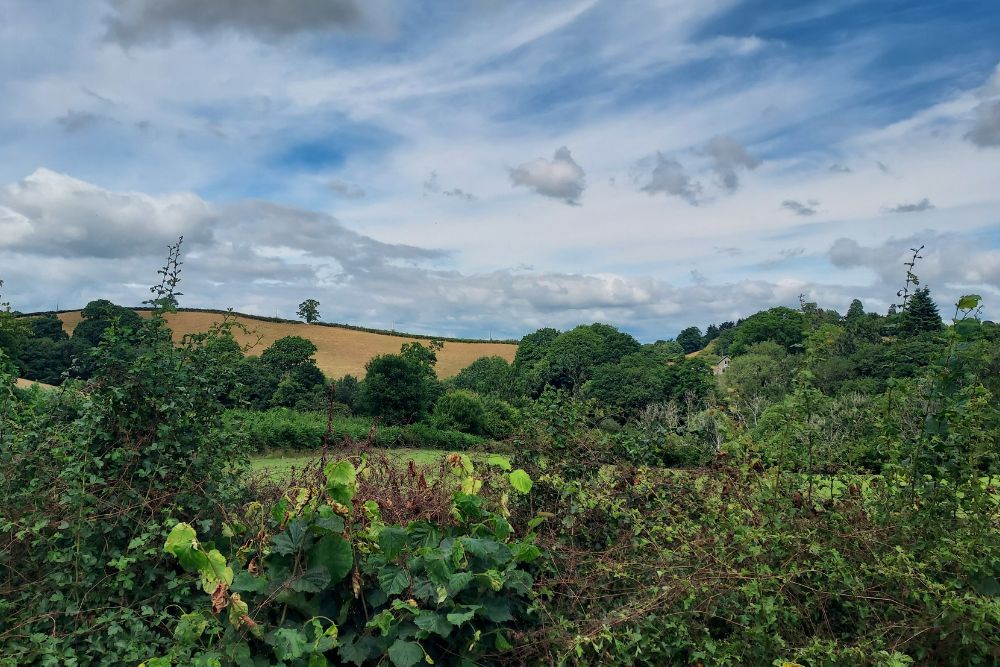
It is set in the Welsh countryside and there are excellent views of the Epynt mountains all around from each pitch. The River Duhonw runs down the bottom of the site. Both the Wye Valley Walk https://www.wyevalleywalk.org/ and the Epynt Way are close to the site. https://www.epyntway.org
Access from the town is straight forward, you are advised to watch the arrival video to help with the one-way system in Builth Wells itself.
The owners called on our first night and took cash payment, they were friendly and helpful.
Facilities
Each CL pitch is hardstanding and has its own water tap and 16amp EHU. Grey water is disposed to the hedge line, a serviced pitch in effect. The CDP is at one end of the field, just through a gate and has a tap above. Pitches are relatively level although we found it easier to use a small ramp to help with putting the canopy up.
There is a shower and toilet block situated in the farm yard and there is also an accessible toilet but not a shower. There is also a wash sink for the campers to use. Rubbish is disposed of here including recycling.
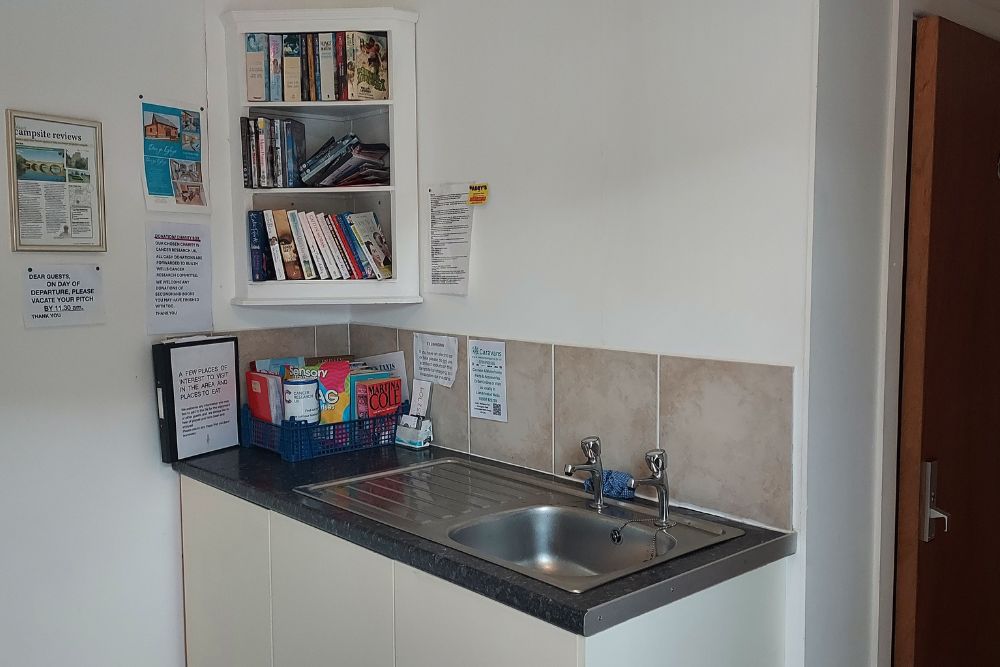
TV and radio reception was ok – AM/FM only for radio. Mobile wise, we could occasionally stream with EE but it was hit and miss. Their coverage checker suggests 4G and 5G coverage should have been reasonable outdoors. Three was poor but their coverage checker suggested 4G should be fine inside and out. Both Vodafone and O2 suggested good 4G coverage inside and out. There was no WiFi offering.
Review of Site Pitch
The hardstanding pitch element is really only sufficient, width wise, for your van or motorhome – awnings, canopies etc are pitched on grass to the side – this is very good as it gives you the best of both worlds. Parking your car is possible to the offside of your van. The pitches are very well spaced out and you do not feel crowded at all.
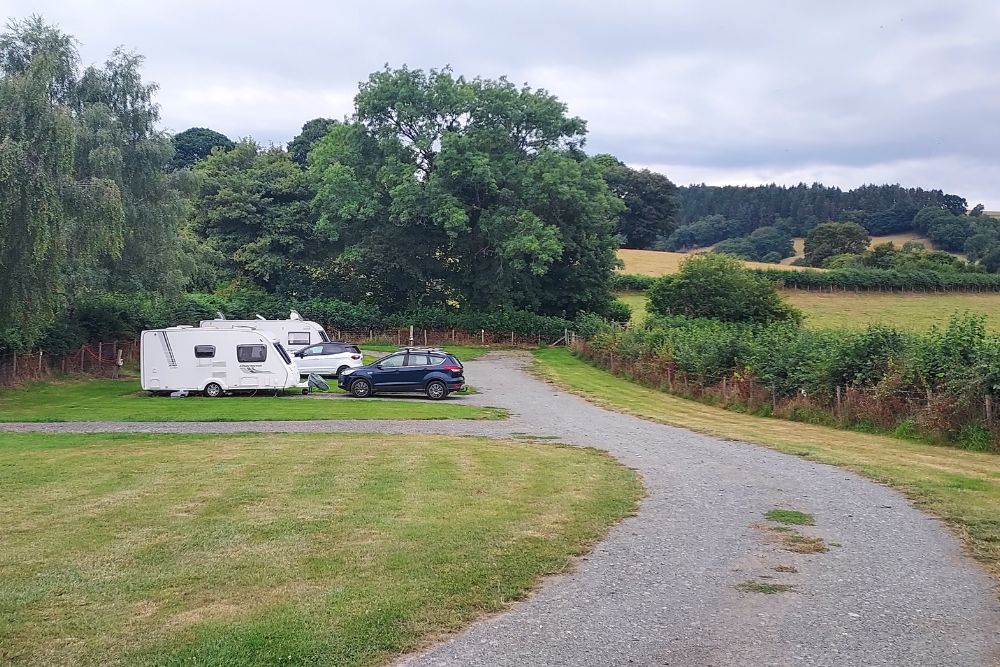
Around and about
Llandrindod Wells – this is a Victorian Spa Town about 20 minute drive north of Builth Wells on the A483. It is very clear on entering the town that it had a Victorian Heyday and the architecture befits that time. There is an interesting high street with a particularly good DIY store, over 3 floors and which stocks all manner of goods, including those useful to caravanners. Powys County Council has its headquarters here and there is a beautiful park to walk around. LW has another claim to fame as this is where the Heart of Wales Railway Line changes drivers. The southern half driver returning to Swansea and the northern to Craven Arms and onto Shrewsbury. Finally, there is a large Tesco Supermarket with reasonable price fuel to the northern end of the town.
Resolution Laundry, [now part of the Wash Me Group] – as ever, laundry keeps mounting up and one thing few CLs offer is a laundry. To that end, it is necessary to source independent facilities. A relatively new feature, which appears to be growing in availability, are these laundries, usually situated on the side of supermarkets and often fuel stations. They usually offer a small 9.5 kg wash and a larger 20kg. This is very helpful as you can wash a complete bag of laundry and bedding at one go. It is all contactless and you get a text a few minutes before the cycle ends. There is also a 20kg dryer. We have found them to be very effective and there is one in Builth Wells, currently by the Texaco garage. Reasonable prices for the ease of completing the laundry. www.thelaundryrevolution.co.uk
There are a good selection of shops in Builth Wells, many independent ones. Bakeries to clothing, to baby wear are all in evidence. There is a Post Office as well. There is parking on the High Street which is one-way only. There are disabled parking spots too but be prepared to make one or two rotations before landing a spot. Car parks are available about a 5-10 minute walk from the main area. It is mainly flat however.
Builth Wells has two main fuel stations, Asda Express & Texaco. Best to check a fuel app to find out the most economical prices.
A short 15 minute drive, through delightful scenery and amazing sunsets will bring you to The Seven Stars Inn in Aberedw. It is run by the local community who rescued it from closure a few years ago. We had superb, reasonably priced meals here. It is a very old building and there is accommodation attached. It is dog and child friendly too. Care needs to be taken when parking as it is mainly on the village road. It was very busy and staff and locals alike were very friendly. www.sevenstarsaberedw.co.uk Advance booking is recommended.
A very pleasant day out can be found at the Elan Valley, its dam and visitor centre with a café and all the facilities. There is a blue route which is relatively flat, allows you to see the dam and a pleasant stroll by the river and some of the forest by the side of the Centre. https://elanvalley.org.uk/visit/visitor-centre/
Brecon is a major market and garrison town in the foothills of the Brecon Beacons. It used to be a major industrial hub dealing with coal, iron and limestone from the surrounding areas. Initially this was moved by canals towards Newport and then to sea. The arrival of the Railways in the mid-19th century saw its demise and by the 1990’s was all but derelict. Following major restoration, it is now a beautiful leisure facility for all to use. A very pleasant afternoon can be spent on a 2.5 hour cruise on a narrowboat with commentary and toilet/refreshments available as well. It is dog friendly and will accommodate wheelchairs providing they are booked ahead. Indeed, during the main season, booking ahead for everyone is strongly recommended.
https://www.dragonfly-cruises.co.uk
To get to Brecon, you turn right from the site onto the road to Brecon. What follows is a glorious half hour drive through some of the most glorious scenery and vistas everywhere you look. It is possible to do the journey to Brecon via the A470 but that is to miss a wonderful opportunity for some superb views. One word of caution between the cattle grids there are free roaming sheep, slow down and enjoy the views and all will be fine.
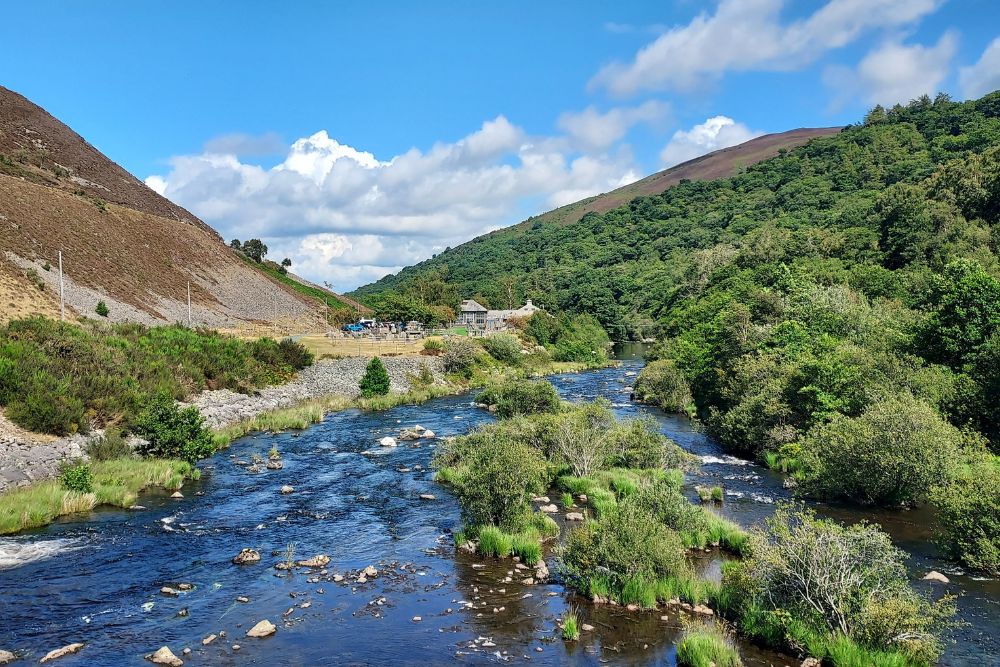
For those people who have active dogs, then the Wye K9 secure dog exercise centre may be of interest. You do need to book, however. http://www.wyevalleyk9.co.uk/
A short twenty or so minute drive will bring you to a very pleasant, dog friendly Garden Centre, cafe, restaurant and all the usual facilities of a large Centre. It is called ‘Old Railway Line Garden Centre’. Massive toasted teacakes and lots of beautiful plants to see. www.oldrailwaylinegc.co.uk
Summary
This is a very pleasant and well facilitated CL. The setting is very picturesque and there is a good range of activities to do for all ages and abilities. We enjoyed our stay very much and would certainly return again.
Eco-friendly upgrades for your static holiday home

If your static caravan is a much-loved UK holiday retreat rather than your main residence, it’s still worth considering some smart, sustainable upgrades. Not only can eco-friendly improvements lower your running costs during peak seasons, but they also help reduce your environmental impact while making your stay more comfortable and efficient.
Here are some simple yet effective ways to make your holiday home greener.
Insulate to stay warm (or cool)
Even if you only use your static caravan during spring and summer, better insulation can make a big difference – keeping the heat in on cooler days and helping to regulate temperature when it’s hot outside.
Double glazing is a good starting point. Upgrading single-pane windows helps retain warmth and cuts down on condensation. You can also add lined curtains or thermal blinds to reduce draughts.
For older caravans, upgrading wall or floor insulation – where possible – can also improve energy efficiency and comfort.
Switch to low-energy lighting and appliances
LED lighting is one of the easiest eco-upgrades and they last much longer. Since holiday parks often have higher electricity tariffs, this swap could save you money over the season.
If you’re upgrading your fridge, heater or kettle, choose A-rated appliances where possible. Even items used occasionally can make a difference if they’re energy-efficient.
Portable solar for off-grid convenience
Many static caravan owners use their holiday homes for weekend getaways or extended summer breaks, making solar energy a practical and eco-conscious choice. If your park allows it, consider installing a small solar panel kit to power your lighting, phone charging, or a radio.
Portable or semi-flexible solar panels are ideal if you’re not allowed to mount them permanently. A basic 100W kit may be all you need for light use. Solar Guide explains how to choose the right size and type of panel for caravan use.
Before investing, always check your site’s rules and make sure your setup is safe and weatherproof.
Further reading: Caravan technology – how innovation is transforming your home on wheels.
Collect and reuse rainwater
If your static caravan has a gutter system or roof drainage, you could install a basic water butt to collect rainwater. This water is perfect for washing your car, cleaning the decking, or watering potted plants around your pitch.
You may only be there occasionally, but over the course of a season, this small upgrade can save litres of fresh tap water. For more tips on water conservation, visit Waterwise.
Choose sustainable materials for upgrades
Planning to refresh your caravan’s interior with new flooring, furniture, or fabrics? Choose low-impact, natural or recycled materials where possible.
Look out for FSC-certified wood, jute rugs, recycled polyester cushions, or low-VOC (volatile organic compound) paints and adhesives. These small swaps improve indoor air quality and reduce reliance on non-renewable resources.
Make small changes for a big impact
Eco-friendly living isn’t just for permanent homes. Making even a few simple upgrades to your static holiday home can make it more comfortable, cost-effective and environmentally friendly.
Whether it’s switching to LED bulbs, harvesting rainwater or investing in portable solar, each small improvement helps reduce waste and energy use – without sacrificing the holiday home lifestyle you enjoy.
Start with the changes that make the most sense for your usage, and build from there. Your caravan may only be in use a few months of the year, but it can still be part of a greener future.
Further reading:
Being eco-friendly in and around your ‘van

